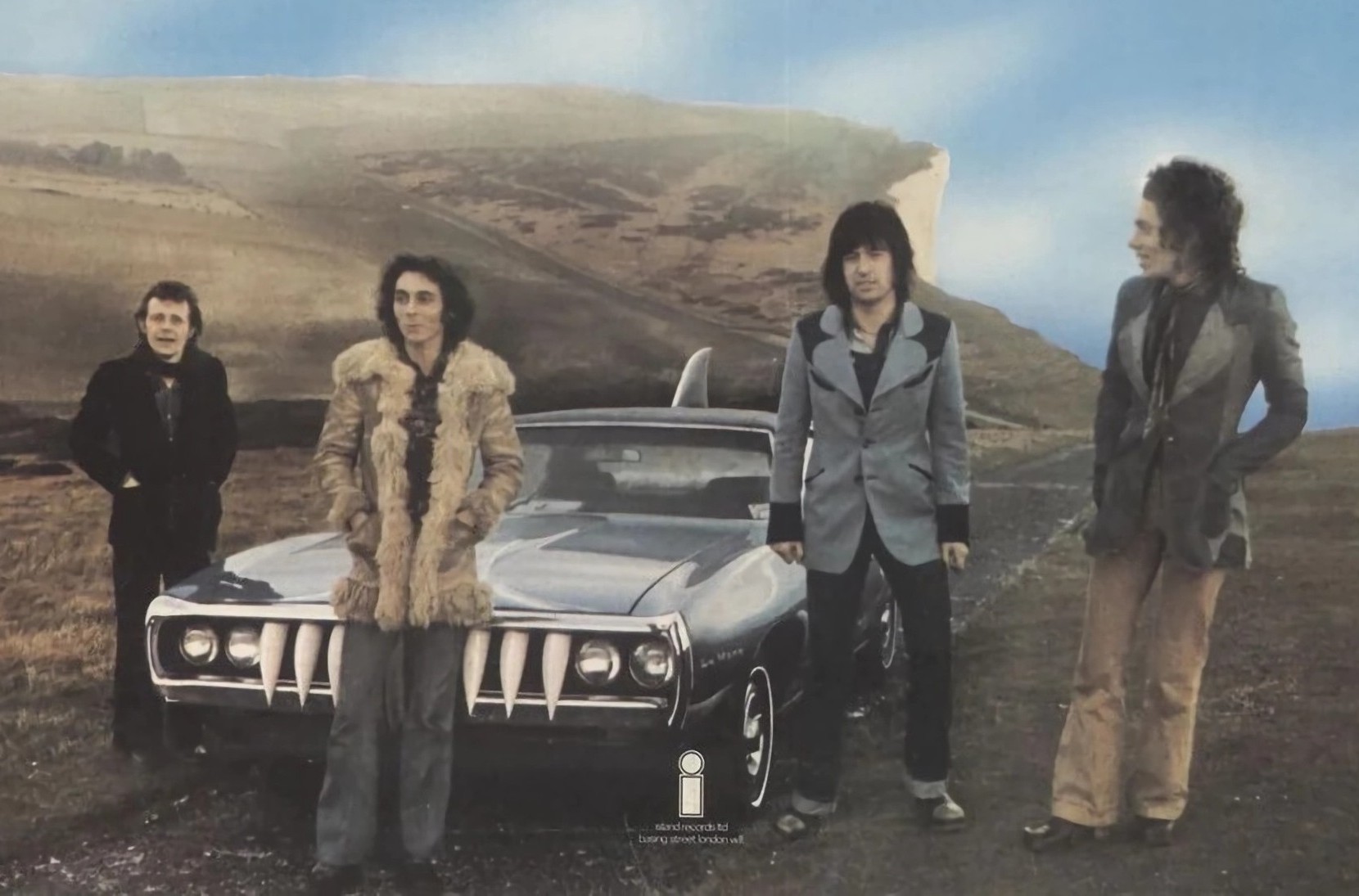
Sharks were a band that shone brilliantly, if only for a short time. Blending rock, blues, and a hint of glam, the group, featuring Steve ‘Snips’ Parsons, Andy Fraser, and Chris Spedding, quickly established themselves as one of the most electrifying acts of their era. At a time when the new box set Car Crash Supergroup: The Island Years 1973-1974 celebrates their legacy, Steve recalls his time with Sharks.
What was your first impressions of Andy Fraser and Chris Spedding? What do you remember from your audition?
They were two very different men with contrasting personalities who shared only the same sense of musical space when they played together. In those days, I treated auditions as if I were the one doing the auditioning. It was obvious that they could all play really well and that the band had possibilities.
Sharks’ debut album, First Water, was critically acclaimed but fraught with challenges. How did the chaotic recording sessions influence the LP and what led to Andy leaving?
I found it depressing that everything took so long to record. 24-track recording in those days was largely made up as you went along, with the machines at Island Studios constantly breaking down. There was plenty of apologetic bullshit from engineers, producers, and studio staff, but four years earlier, it would have been simpler and more effectively recorded on an 8-track machine. Andy left because he really wanted to be in a unit where he could be the lead singer and only songwriter, which is what he did after Sharks (The Andy Fraser Band), though he never owned up to that until years later.
The band gained a reputation as a superb live act. What were the most memorable moments and how did your theatrical approach to promotion influence public perception?
After Andy left, we concentrated on becoming an effective live unit with an aggressive style that could contain moments of musical inspiration. By the time we hit the U.S., we were the real deal. Chris kept getting better and better, so every night of that tour was special. The car was Island Records’ idea. It was fun, but it did make us look like a hype outfit and didn’t really do us any favours.
The cover art for Car Crash Tapes pays homage to the infamous Sharkmobile crash. How did that event affect morale and your vision for Sharks’ future?
Andy used the crash as an excuse to leave, and morale was low until we found a bass player to fill his shoes in Busta Jones. Car Crash Supergroup is an economical and graphic way to describe a very complicated situation where so many things were going wrong both inside and outside of Sharks.
Mick Jagger recommended Busta to join. How did his addition, along with Nick Judd, contribute to Sharks’ evolution?
Busta and Nick were both excellent players, and Busta was a terrific performer, so as a stage act, we had it going on both the audio and visual level.
Sharks have been cited as influences by The Clash. What do you think made Sharks resonate with them and many others?
Our monthly gigs at the old Marquee Club on Wardour St. became something of an event. As well as Mick, both Steve Jones and Paul Cook (later Sex Pistols) would be there, along with more famous faces such as Jeff Beck and Bryan Eno. I like to think it was because we were hotter than a mustard sandwich!
After decades away, what inspired you and Chris Spedding to resurrect Sharks?
I retired from performing in 1982 and spent the next 28 years as a composer/producer for film and TV. When I got the itch to perform again in 2010, Chris was the first person I called. We formed the King Mob Beat Group with Glen Matlock and Martin Chambers from the Pretenders. That was a sensational band and the Force 9 album is my personal favourite.
When the group collapsed it seemed like reviving Sharks was the most viable option to keep playing together. I really enjoyed the return and it seemed to close a loop. The two studio albums and the live recordings show that we hadn’t lost any of the old intensity. Plus I got to play with Paul Cook who is an incredible drummer and lovely guy.
What was it like revisiting the band’s history in Not A Rock-Doc: A Shark’s Tail?
Well the film doesn’t say much about our history. It seemed more dynamic to focus on the struggles of reviving an analogue band in a digital age.You don’t have to know anything about Sharks or seventies rock to enjoy it. The film is for everyone, not just for trainspotters.
If you could change one thing about Sharks trajectory during the 1970s, what would it be, and why?
We should never have signed a total package deal with Island Records. They were our record company, gig booking agents, music publishers and crucially our management. A group of strong minded individuals need strong management and Chris Blackwell (then Island head honcho) was never there when needed. He totally abdicated his legal and moral responsibilities to shepherd the band. By the time we got rid of him it was too late, the rot had already set in.
What do you hope listeners take away from this new compilation? Is there a particular track you feel encapsulates the essence of Sharks?
I hope they get an appreciation of the band’s dedication to making unique music. Three different albums with three different line-ups so I’ll take “Snakes And Swallowtails” from First Water, “Sophistication” from Jab It In Yore Eye and “The Shadow Knows” from the unreleased 3rd album.
Further information
Sharks: Car Crash Supergroup – The Island Years 1973-1974, 3CD Box Set is out now




